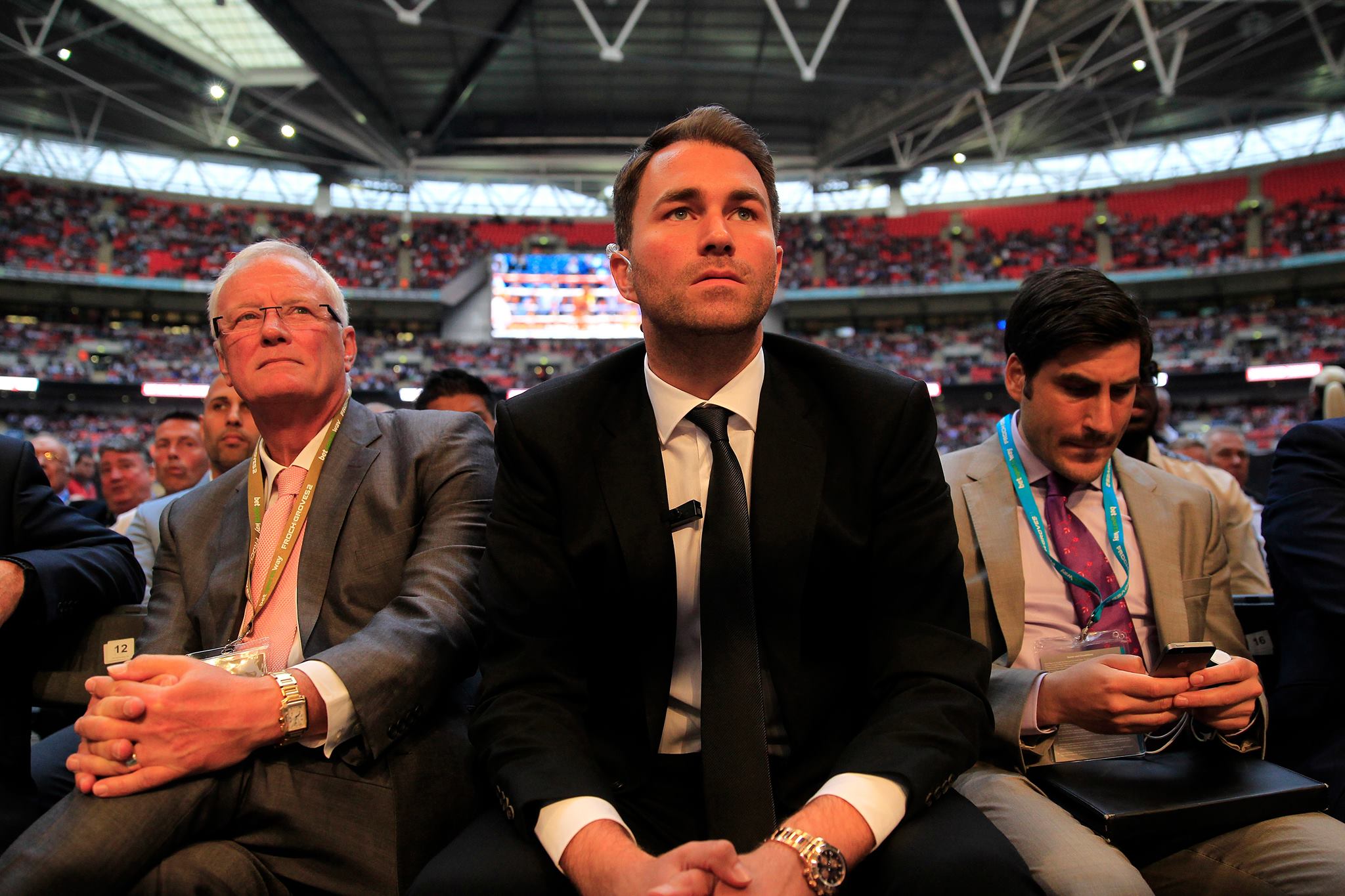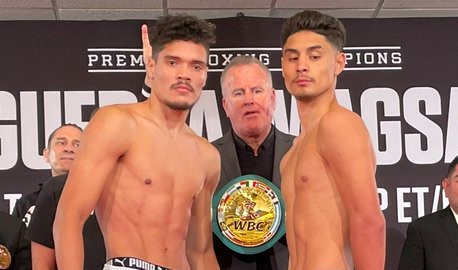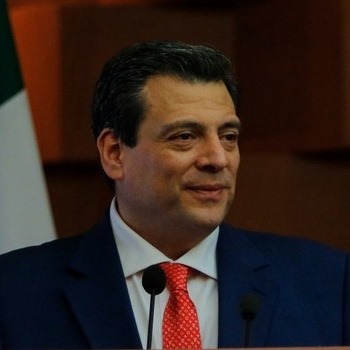By: Oliver McManus
In a contest that heavily invoked memories of Anthony Joshua’s grudge match against Dillian Whyte, on December 12th 2015, Britain’s latest heavyweight prospect protagonists were putting their unbeaten records on the line for the prestige of the Lord Lonsdale belt. Daniel Dubois and Nathan Gorman, a more mellowed pairing than their predecessors, share a past hinterland with stories of sparring splattering the media but the talking, or lack of it from Dubois, was put to one side just after 11pm, UK time, as the punches commenced.

Dubois, the silent partner in this venture, looked cold and calculated as he almost immediately stalked his opponent around the ring. Gorman was speculative with some lofty overhand punches just to feel out the range and he caught Dubois on the approach but his younger opponent was just as quick to back his head out of the way. The jab of Dubois, by far his strongest punch, was continually floated out and his Nantwich based opponent would look to reply with a leaning left hook on each occasion.
The second round became scrappy with Gorman’s overhand shots being countered by a downwards opposite with Dubois, the taller man, happy to exchange shots with a fluidity not necessarily matching his persona. Caution lacked from both fighters with them swinging in the second – each fighter landing shots of their own – but the more sinister work was coming from the Peacock’s Gym product. It was the jab that ensured Dubois was first to the punch and that shot wasn’t apparent from Gorman who opted to lead with that heavy right hand but he wasn’t able to set it up.
Dubois could, quite literally, sense blood as it flowed from the eye of his adversary and three clubbing right hands interspersed with the jab dropped Gorman at the start of the third. He regained his feet and was windmilling in a fashion reminiscent of Whyte in that contest against Joshua. Dubois was composed even with a finish seemingly imminent and produced a more controlled body of work than his counterpart – the jab continued be thrown with regularity and there was a healthy variety to Dubois’ work.
The 21 year old continued that momentum by starting fast in each round and not really giving Gorman, aged 23, an opportunity to settle into any rhythm of his own. This fight, firmly, was being fought at the will of Dubois and the older man seemed to be ever so deflated following that period of sustained success from Dubois. And yet that non-existent jab cropped up towards the end of the fourth and, with it, came two measuring out uppercuts.
That didn’t last long, however, with Dubois starting the fifth with as he did the third; a looping overhand right clipped Gorman’s temple and sent him staggering downwards. Dubois, still, maintained that precautionary outlook and looked simply to control proceedings – much to the frustration to the Gorman who just couldn’t settle. With less than thirty seconds to go of the fifth round, a tempting left jab drew the counter from Gorman and Dubois was able to exploit the gap with a perfectly placed right hand that saw his opponent drop the floor and fail to beat the count.
Damn, Daniel. A thoroughly impressive performance that shows, beyond doubt, why he’s considered as one of the best prospects in all of world boxing. That right hand is going to cause an awful lot of problems on the world scene but for now Dubois can enjoy life as the newly crowned British champion thanks to a fifth round TKO.
Joe Joyce was looking to edge his way closer to a world title by taking on, former world title challenger, Bryant Jennings in only his tenth professional contest. Despite Joyce being a strong betting favourite this contest was certainly credible, more so than the ‘Gold’ title at stake, and a good benchmark to see how the British fighter could cope with more crafty, experienced competitors than his previous counterparts.
AdamBooth’s fighter weighed in 30lbs heavier than his Philadelphian fighter and it showed in terms of the sheer width of Joyce’s abdominal muscles. Jennings was, mind, the second lightest opponent that Joyce has faced and he looked to force that agility form the off as he shillied his way up close. A hurtful left hook prompted Joyce to drop his elbow to cover up but there was limited urgency in the follow-up from Jennings who seemed unaware of Joyce’s discomfort.
Jennings’ guard was staunchly tucked around his heard, perched at the ears, but the staccato Joyce was able to find success with hooks to the midriff. Every punch was thrown with an air of nonchalance, such is the emotionless demeanor of Joyce, and he quickly eased on top of proceedings with a strong jab. The Olympic silver medalist looked a little looser in the third round as he bobbed his head around to prevent Jennings from getting shots off with certainty; an underarm left, thrown like a bowling ball, was a sign of Joyce’s enjoyment.
That extra stockiness to the Putney fighter saw him able to outwork and outmuscle his, admittedly, more agile opponent for large parts of the contest. Jennings was fast with the counters and able to slip shots through the guard of Joyce but, every time he did, the Brit would rally with thunderous punches to sap energy away his opponent. As is expected with Joyce, none of the punches looked lightning fast but all of them were bruising in their delivery.
Naturally the more eye catching work was being done by the American, given his increased speed and flair, but he wasn’t able to transfer those bright sparks into a whole round of sustained pressure. Instead it was Joyce who was able to find the more considerable success despite, arguably, taking the cleaner shots in thanks to the frequency of his punches.
The American was never out of it, though, and persisted in being there or thereabouts with some genuine shots landing in almost every round and he seemed to be spritely throughout. From the fifth to the seventh round Joyce seemed to take his foot of the gas a little to allow Jennings back into the contest and this certainly wasn’t as clearcut as you might have expected.
Both men were warned at points in the contest – Joyce for use of the shoulder and Jennings for low blows – and it shaped out to be a really intriguing clash of wills and styles. Neither man fully able to commit to their own style, sort of meeting each other in the middle, but both were reasonably successful in their desired gameplan.
Yet those ‘championship rounds’ saw a re-energised Jennings who was determined to stand toe-to-toe with Joyce. The snap of the punches was with the American who was refusing to get beaten down by the physicality of the Juggernaut. Amid all the liveliness, though, came a low blow and a point was deducted from Jennings’ tally to unwind all of that good work.
A confusing contest, more than anything, which contrasted the undeniably crisper work of Jennings with the bustling physicality of Joyce. The question raised is ‘does one good punch outscore ten average punches’ and the judges, in their wisdom, deemed that it does not with Joyce taking the decision 118-109, 117-110 and 115-112.
Reigning British middleweight champion Liam Williams bridged the gap to world level with a faultless win over Karim Achour: the bout being fought for the WBC ‘Silver’ title. The Ingle Gym fighter looked focused from the get-go and physically appeared the far bigger, broader man. Achour, based out of Oise, was willing to come forward but that played into the strengths of Williams who was able to push off his back foot with some heavy shots. A brash shot, whilst coming out of the clinch, caught Achour on the cheek and a couple of quick follow-up shots dropped the Frenchman.
Williams, in sniper like fashion, was locked onto his man and a right hook followed by a short, chipping left uppercut caught Achour halfway on the fall to send him flailing to the canvas for a second time. The referee called off the contest despite Achour regaining his feet with Williams looking menacing in the brief time the fight landed. It was the opening right hook over the top of Achour’s arm that scrambled him and he never looked on steady ground thereafter. His Welsh opponent becomes the first man to stop Achour and did so at a canter.
Sunny Edwards opened the televised bill in stylish fashion with a beautiful display of silky backfoot boxing against Hiram Gallardo. His Mexican opponent, the same age at 23, quickly looked overmatched with Sunny finding snap to his punches fairly quickly. Yet again it was the movement of Grant Smith’s charge that drew the eyes and left Gallardo falling short when he attempted to reply with artillery of his own.
The WBO European champion, fighting for the vacant IBF International belt, was given a dubious knockdown in the second when Gallardo caught his feet but it was always smooth sailing for the Croydon fighter. Despite visibly being in a different class to Gallardo, Edwards was up against a well-conditioned fighter who was capable of taking a whack – and did so on a few occasions.
There were a few looser rounds around the halfway mark with Gallardo able to lurch in and prompt more of a ‘scrappy’ fight but Edwards quickly regained the fluidity to his footwork and start to stamp his authority on the contest. Frank Warren’s bluechip prospect boxed peerlessly and was able to find significant success throughout the contest; when Gallardo did provide pressure, Edwards adapted to the backfoot with ease. His judgment of distance and variation of angles was joyous to watch and invoked reminders of, dare it be said, a certain Vasyl Lomachenko.
Even in the final couple rounds, and leading comfortably, there was no complacency to Edwards’ performance as he carried his high-paced tempo right to the end. Slick from the super flyweight to advance his record to 12-0 without even the slightest of blip on the night, truly methodical with his punches and sublime with his fleet of foot. Showtime takes it by a resounding 99-90 on all three scorecards.
Welling’s Archie Sharp made a successful maiden defence of his WBO European super featherweight title with a convincing sharp-shooting win against Cambuslang’s Jordan McCorry. The champion, 25, was sporting more ragged haircut to usual but there was nothing scrappier about his performance in which he boxed patiently. McCorry sought to tempt Sharp into a brawl by leaping in with feisty punches in the opening rounds but Sharp was wise to take a step back and to buy himself time to think.
The slightly longer legs of Sharp were able to scamper out of trouble as he hopped around the ring and the third round saw measurable success for the 24 year old: a lovely left hook, thrown with little pull-back, bruised McCorry’s ribcage and the Scot gathered his breath whilst on the canvas. That seemed to prompt a more assured performance from the Champion who was comfortable in the face of McCorry’s resilient feistiness.
Plenty of big, searching uppercuts and hooks were being unfurled by Sharp but his jab was barely visible and that resulted in those more aggressive punches failing to have telling impact against a gritty opponent. The success bred confidence within the Champion whose defense was quite porous at times and could well have been exploited against a higher quality operator but he was doing enough to keep on top of the contest. 98-91 on all three cards to Archie Sharp.
But despite all of that entertainment the night belongs firmly to the new heavyweight champion of Britain, Daniel Dubois. Following in the footsteps of Tyson Fury, Lennox Lewis and Anthony Joshua in becoming holder of the Lord Lonsdale belt but, who knows, he might just become the best of the lot.


















